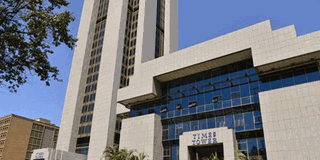Premium
Blow for KRA as court stops plan to increase excise duty

Times Tower, Kenya Revenue Authority headquarters in Nairobi.
The High Court has blocked the Kenya Revenue Authority (KRA) from implementing the new regulations on excise duty that will have seen prices of beet, bottled water, and cosmetics rise.
Justice Hedwig Ong'udi put Regulation 5 of the Excise Duty (Excisable Goods Management System) Amendment Regulations of 2023 on ice after the Law Society of Kenya (LSK) challenged them on grounds that the statutes were formulated without carrying out public participation as required by law.
The LSK had argued that the new levies would cause a steep rise in prices, threatening the survival of manufacturers of consumable products.
The proposed regulations seek to increase the fees of excise stamps for bottled water, juices, and any other non-alcoholic drinks, cosmetics, alcoholic beverages, tobacco and nicotine products, and export products.
“The exercise of this mandate contrary to the law not only prejudices the petitioner but the public at large. In this matter, I am persuaded that the public interest outweighs the respondent's mandate and tilts in favour of the petitioner. Therefore, putting the above in mind, I am satisfied that the principles of granting conservatory orders sought in this matter have been satisfied as will aid in meeting the ends of justice," Justice Ong’udi said in the ruling.
The court had in March dismissed the same case after ruling that LSK moved to court prematurely as the regulations were still being debated and had not been enacted.
The KRA argued that the application and petition were premature as the draft regulations were undergoing the legislative process of public participation according to Article 10 of the Constitution. It submitted that, from the legal notice, no change in content had been undertaken as the regulations are a replica of the draft, which had earlier been challenged.
The LSK argued that, whereas taxation is necessary for the nation because it sustains public welfare and public good, the power to tax is very delicate and vulnerable to abuse by those in authority.
“The regulations are improper as they seek to adjust the price of excise stamps applicable to excisable goods, whose implementation threatens the survival of manufacturing businesses engaged in the sale and distribution consumables as well as other innocent third parties," LSK chief executive officer Florence Muturi said.
The adjustment would have seen the increase of excise stamp prices of the products from Sh1.5 to Sh3 per stamp. Also adjusted were prices of wines including fortified wines, spirits exceeding 10 percent from Sh2.8 to Sh5 per stamp, and bottled water at Sh0.5 per stamp.
The LSK further pointed out that the prices of cosmetic and beauty products of tariff heading numbers 3303, 3304, 3305, and 3307 would rise from Sh0.6 to Sh2.5 per stamp.
Also targeted were tobacco products, tobacco substitutes, nicotine products, and electronic cigarettes at Sh5 per stamp.
“There is no justification whatsoever to increase the price of the excise stamps. Regulation 4 of 2017 clearly provides the features of an excise stamp is to deter counterfeiting, facilitate tracking of the stamps and excisable goods along the supply chain and enable accounting for the production of excisable goods manufactured or imported," the LSK submitted.
Ms Muturi said in an affidavit that comparing other countries, where the tax stamps are procured from the same supplier, SICPA Securities, the rate on tobacco products in Kenya is still the highest across the world with little value in terms of functionality for purposes of tax administration.
"The [new rates] will also widen the excise duty tax rate in the East African Community by continuously disadvantaging the manufacturers in Kenya against their African counterparts," Ms Muturi said.
The LSK said there was risk of a black market forming should KRA be allowed to implement the regulations. The fresh prices add to the recent 6.3 per cent adjustment for inflation that came into effect last October and the usual rate revisions contained in the annual budget.





